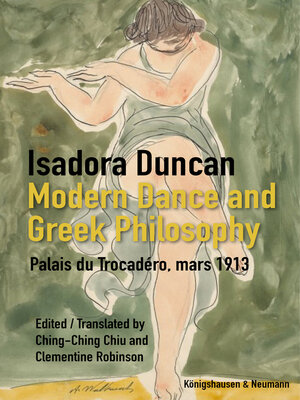
Sign up to save your library
With an OverDrive account, you can save your favorite libraries for at-a-glance information about availability. Find out more about OverDrive accounts.
Find this title in Libby, the library reading app by OverDrive.



Search for a digital library with this title
Title found at these libraries:
| Library Name | Distance |
|---|---|
| Loading... |
In the early 20th century, dance had lost its divine significance and became known as a mere form of entertainment. Isadora Duncan (1877–1927), a revolutionary dancer, aimed to restore dance to a higher form of art, to make it a new universal religion dedicated to ›Nature . Her dance is reminiscent of the festival of Dionysus, a state of flow, evolution and vitality, which the traditional ballet had long forgotten.
The following piece of literature chronicles Isadora Duncan's extraordinary journey as a revolutionary artist, offering an unfiltered gaze into her defiance of societal norms and her artistic evolution. It includes an English translation by Clementine Robinson of the French program Palais du Trocadéro, March 1913, featuring memoirs and reflections from a diverse group of academics, critics, and enthusiasts of Duncan's time. The essay titled Isadora Duncan, Modern Dance and Greek Philosophy by Ching-Ching Chiu delves into the profound influence that ancient Greek civilization had on Duncan's choreography, evoking the origins of dance in the Dionysian festivals. The book is further enriched by a vivid collection of photos and artworks that capture Duncan at the height of her career. Duncan's legacy endures as a testament to individuality, creativity, and the relentless pursuit of artistic freedom, making her a powerful symbol in the world of dance and beyond.







